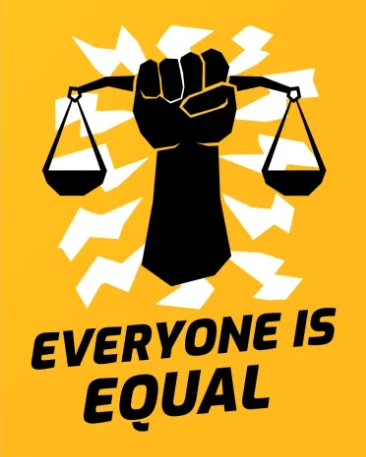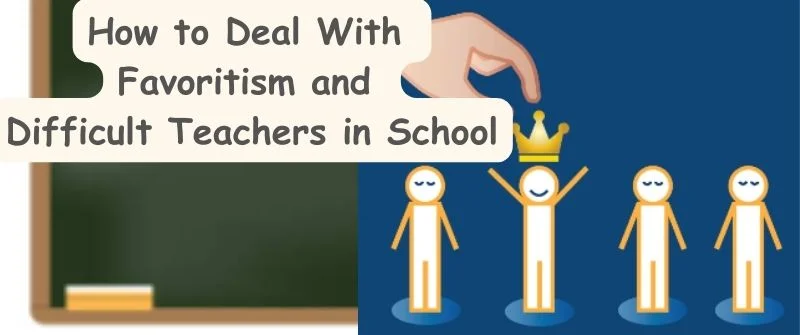Teacher favoritism is very unfair and can demoralize students to the extent of negatively affecting their performance in school. It can also jeopardize their life outside the classroom.
There are various cases within educational institutions where teachers have been accused of favoritism and being difficult. This can be very frustrating for students who are on the receiving end.
This article will explain how to deal with teacher favoritism and difficult teachers in addition to demonstrating how teacher bias can affect students.
Further, it will explore how favoritism can be avoided within the classroom.
How to Deal With Teacher Favoritism
1. Stay Positive and Maintain your Perspective

When you find yourself in a situation where there is teacher favoritism, it is advisable to approach it with a positive mindset.
Even though the situation is dire and it is negatively affecting your mental status, maintain a positive mindset.
Ensure that the situation does not get into your head in such a way that you can no longer focus or concentrate in class.
Focus on your achievements and progress rather than comparing yourself with the students who are being favored by the teacher.
2. Self-Reflection
Try as much as possible to reflect on your performance and behavior in class.
Assess whether there are areas in class where you can enhance your performance and improve. This is necessary because you need to perform exceptionally to compete with the favored students.
Additionally, you should actively participate in class even though the teacher is demonstrating a negative attitude toward you.
Demonstrate to the teacher and the class that you have a genuine interest in the subject matter. This may make them rethink their attitude towards you.
3. Build a Relationship
This may be difficult for you but it would be really helpful if you built a relationship with your teacher to deal with favoritism.
Make an effort to nurture a positive relationship with your teacher. Do not focus on how difficult they have been towards you because this will make you resent them even more.
Be attentive, respectful, and engaged during class when the teacher is teaching. You may ask relevant questions to demonstrate genuine curiosity.
When you show that you are dedicated and interested in what the teacher is teaching, you may change the perceptions the teacher holds towards you.
4. Seek Guidance and Feedback

As noted, it is good to seek your teacher’s attention and show them that you have a genuine interest in what they are teaching.
You can take this up a notch by seeking guidance and feedback from your teacher concerning your projects or assignments.
By asking for suggestions on how you can improve in your projects and assignments, it will demonstrate to your teacher that you are committed to learning and you trust their suggestions.
Further, seeking guidance and feedback from your difficult teacher shows initiative in addition to helping you understand their expectations better.
5. Develop Good Relationships with other Teachers
You can also deal with teacher favoritism by seeking guidance and support from other teachers who you can approach better.
It is advisable to build positive relationships with teachers who value and appreciate your efforts and offer you a supportive learning environment.
They can provide valuable mentorship and advice outside the classroom. Good teachers will always be very happy to mentor and advise students even outside the classroom.
6. Seek Support from Peers
Connect with classmates who may be experiencing similar feelings of teacher favoritism and talk to them. Share your frustrations and concerns.
When you talk to such classmates, you can collectively share strategies to overcome teacher favoritism, provide support to each other, and even possibly approach the teacher or your school’s administration as a group.
7. Communicate your Concerns
If possible or when you are comfortable, you may express your displeasure with favoritism to the teacher. Make sure you approach them with a lot of care because favoritism is a strong accusation.
Choose a suitable time to have a respectful conversation with the teacher and share your perspectives and concerns.
While this should be the case, you should know that your teacher may be unreceptive or not willing to change their behavior.
If all the aforementioned strategies fail to work, focus on your strengths and motivate yourself to keep pushing on. You may seek support from a counselor or trusted adult.
How to Deal with Difficult Teachers
Stay Calm and Composed

When dealing with a difficult teacher, you should remain calm and composed. You should not react emotionally or become confrontational.
Take a deep breath, mind your composure, and approach the issue with a level-headed mentality.
Understand their Perspectives
Try to understand your teacher’s point of view or the reasons why they are difficult towards you. This is because they may have teaching styles that are different from what you are used to.
Additionally, they may be experiencing some personal challenges. Empathy can be helpful if you wish to approach the situation with more patience and understanding.
Communicate Respectfully
If you have issues or concerns with your teacher, address them with your teacher respectfully. Select an appropriate time to engage with your teacher directly.
Focus on specific behaviors or issues instead of attacking the teacher personally.
Seek Clarification
When unsure about assignment instructions or expectations, seek immediate clarification by asking specific questions to aid your understanding of the requirements.
Clear and concise communication helps minimize potential conflicts and misunderstandings.
Build Rapport

Try to build a positive rapport with your teacher by showing interest in what the teacher is teaching, actively participating in class, and respecting the teacher’s authority.
Documenting the Incidents
You may document the times, dates, and occurrences details if the behavior is persistent and it is negatively affecting your well-being and academic behavior.
This can help if you wish to escalate the situation to the school’s authority such as the principal or school counselor.
Other additional ways of dealing with difficult teachers include seeking assistance from other resources if the teacher does not want to help you, focusing on your learning, and seeking support from your counselor.
Impact of Teacher Bias on Students
1. Disparities in Academic Performance
If a teacher demonstrates a bias toward particular students, those who are favored are likely to receive preferential treatment, such as opportunities for participation, praise, and more attention.
Conversely, those who are not favored may receive less support, be overlooked, and have their academic achievements undervalued.
Such differential treatment results in disparities in students’ academic performance because they will have unequal access to opportunities and resources to learn and grow.
2. Self-Esteem and Motivation

Student’s self-esteem and motivation can be significantly affected if they are treated unfairly due to teacher bias.
Those feeling undervalued or neglected may lose confidence in their abilities and develop a negative self-image.
It decreases students’ motivation, class participation, and academic performance.
3. Classroom Dynamics and Engagement
Bias creates an uncomfortable or hostile environment within the classroom. Students receiving no favors may feel excluded, marginalized, or alienated.
This negatively impacts their participation, engagement, and willingness to be part of class activities and discussions. This creates a division among students.
4. Perceptions of Potential and Ability
Teacher bias influences how students perceive their potential and abilities. If students are constantly experiencing bias or are treated as incapable individuals, they may internalize such perceptions. This jeopardizes their academic performance and social life.
5. Long-Term Consequences
The effects of such bias from teachers can extend beyond the academic experience. They may develop a negative perspective toward education, school, and authority figures.
This can negatively impact their educational aspirations, academic trajectory, and career choices.
How to Avoid Favoritism in the Classroom
Self-Reflection

Teachers can avoid favoritism in the classroom by regularly reflecting on their attitudes and biases toward students.
This can help teachers become more aware of the possibilities for favoritism and take the necessary steps to prevent it.
Get to Know Students Individually
Teachers should take time to understand the strengths, unique qualities, and challenges of each student within their class.
They should also know their backgrounds, interests, and learning styles.
When teachers genuinely connect with their students, they can understand their students more and appreciate them.
Treat all Students Equally
As a teacher, make sure that you treat your students equally in terms of expectations, resources, and opportunities.
Maintain consistency in your classroom management, discipline, and grading approaches. Do not give or show any preferential treatment to any student.
Provide Differentiated Instructions
As a teacher, you should recognize that students have different learning abilities and needs. As such, give differentiated instructions by proving various materials and approaches to meet students’ diverse needs. This prevents favoritism.
Encourage Student Participation and Voice
Encourage all students to participate in class. Ensure that students feel safe and comfortable while sharing their ideas and thoughts.
Use Varied Assessment Methods
To avoid bias, teachers should implement a variety of assessment methods to evaluate the learning progress of students.
Include projects, group work, presentations, and individual assignments. This prevents favoritism since students can demonstrate their skills and knowledge in different ways.
Teachers can also avoid favoritism in their classes by also providing constructive feedback to all students, engaging in students’ professional growth, involving parents and guardians, and seeking feedback from colleagues and administrators.

Joseph is a freelance journalist and a part-time writer with a particular interest in the gig economy. He writes about schooling, college life, and changing trends in education. When not writing, Joseph is hiking or playing chess.
